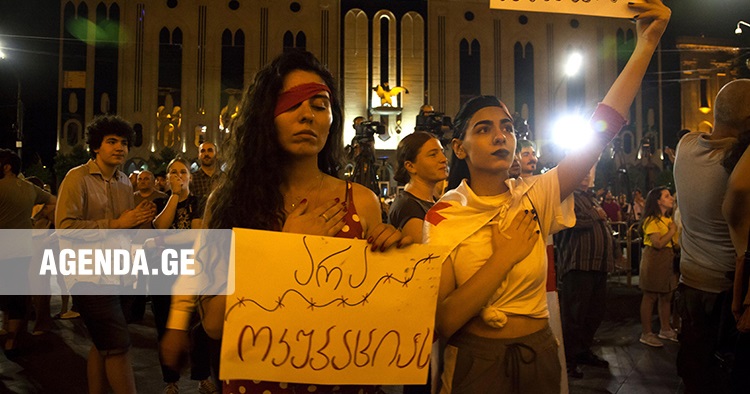Georgian Young Lawyers Association urges parties not to implement amnesty for June 20, 2019 incidents

GYLA has opposed granting amnesty to law enforcement it alleges perpetrated "mass violation of rights" during the dispersal of the June 20-21, 2019 rally in Tbilisi. Photo: Nino Alavidze/agenda.ge.
The Georgian Young Lawyers Association (GYLA) has urged political parties not to implement amnesty for alleged violations committed by law enforcement during clashes in Tbilisi on June 20-21, 2019, after a clause for amnesty was included in the proposal by the European Council President designed to solve the political crisis of the recent months in Georgia.
The organisation released its reaction to the proposal, made public on Sunday by President of the European Council Charles Michel, who - alongside European Union mediator Christian Danielsson - worked to help the Georgian government and the opposition end an impasse between them since the October 31, 2020 parliamentary elections.
In its statement GYLA said even though it had supported the signing of the proposal for compromise by the parties, any agreement would have to be "consistent with the Georgian constitution and international standards".
The lawyer group said it was "unacceptable to use amnesty or pardon" with regard to cases of "mass violation of rights" during the law enforcement's dispersal of the rally involving political opposition and citizens during the night of June 20-21, 2019.
Sparked by the presence of a Russian Duma MP at the Georgian parliament on the backdrop of Russia's ongoing occupation of two of Georgia's regions, the protests resulted in clashes that left a number of participants injured, with some granted the status of victims later that year. GYLA is representing the interests of protesters and reporters affected in the dispersal both at the national and European level.
The organisation's reaction to the proposal said using amnesty with regard to "serious violations of human rights by representatives of state" would be against Article 3 of the European Convention on Human Rights, which deals with torture and "inhuman or degrading treatment or punishment".
Allowing amnesty for cases of the June 20-21 incidents would undermine individual accountability of alleged perpetrators as well as "public trust and respect for the law enforcement system", the GYLA statement reads.
The proposal - signed by the government and a number of opposition parties on Monday - mentions using "amnesty and/or by taking such steps as to produce an equivalent outcome" through the Georgian parliament "[I]n the interest of Georgia's political stability".
The amnesty is proposed with regard to two cases involving opposition leader Nika Melia - charged for his role in the violent clashes during the June 20-21 night - and Mtavari Arkhi channel co-founder Giorgi Rurua, charged with illegal possession of firearms in connection with the events of the night.
The political opposition in Georgia has alleged both Melia and Rurua to be political prisoners, with their imprisonment becoming one of the sticking points of the recent political crisis in the country, as the opposition had refused to enter the parliament formed as a result of the October 2020 elections.
The signing of the proposal mediated by the European partners has been celebrated by the government and its international partners as an example of compromise leading the country out of the impasse. In his reaction Michel called it an "achievement" that would "take Georgia forward along its Euro-Atlantic path".
 Tweet
Tweet  Share
Share